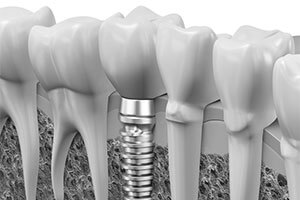 Dental implants are an option to replace missing teeth and provide a fixed solution to removable dentures. Dental implants offer natural looking replacement teeth that are fixed in the jaw. Implant treatment provides an option to correct the most troublesome cases associated with missing teeth and poorly fitting dentures.
Dental implants are an option to replace missing teeth and provide a fixed solution to removable dentures. Dental implants offer natural looking replacement teeth that are fixed in the jaw. Implant treatment provides an option to correct the most troublesome cases associated with missing teeth and poorly fitting dentures.
A dental implant is an artificial tooth root made of titanium that is surgically placed into the jaw bone and used to support tooth replacement structures such as crowns, bridges and dentures. While the implant mimics the root of the tooth, the replacement structure looks and feels just like a natural tooth, providing patients with a permanent solution for missing teeth that replicates the fit and feel of natural teeth.
Benefits of Dental Implants
Dental implants are considered a modern and successful restorative treatment option. They offer many benefits over other tooth replacement methods including:
Enhanced Esthetics
Implants are placed within the gums. The crowns that are attached to them emerge in a manner similar to a natural tooth. This offers a more realistic and natural look compared to other alternatives.
Reduction of Bone Loss
When a tooth is lost, the supporting bone structure gradually recedes over time. Dental implants integrate with the jaw bone and stimulate its preservation, allowing the bone to stay healthy and intact while maintaining natural facial contours and appearance.
Preservation of Adjacent Teeth
Other methods like fixed bridges must be anchored to adjacent teeth, unnecessarily sacrificing the quality and health of the surrounding teeth. Dental implants are independent and do not rely on the support of other teeth, thus providing the ability to preserve the good teeth.
Easier Eating
As the jawbone shrinks, chewing efficiency is reduced, making it difficult to eat certain foods. Dental implants can restore chewing efficiency comparable to that of natural teeth, allowing patients to eat their favorite foods with confidence and without discomfort.
The Dental Implant Procedure
All treatment begins with a thorough exam and consultation. Typically, the process can take from three to six months. In some cases, the process may take longer because additional treatments, such as bone grafting, may be required to build up the bone in order to receive the implant. The procedure and time frame depends on several factors:
- Dental health
- Condition and quality of the jaw bone
- Number of teeth involved
Dental implant restorations usually take place over a few appointments and involve several steps:
The First Step
A dentist or oral surgeon will cut into the gum to expose the bone. One or more implants are precisely placed into the jaw bone to mirror the location of the root of the missing natural tooth.
The Second Step
After appropriate healing time has taken place, to allow for the implant to fuse within the bone, impressions of the teeth and bite are taken to custom fabricate a connector post or abutment, and crown.
The Final Step
At the final appointment, the oral surgeon reopens the gum to expose the implant. The abutment and crown are attached to the implant, completing the process.
Some patients may experience minor soreness after the dental implant procedure which can be treated with over the counter ibuprofen medication.
Dental Implant Results
Patients receive all the benefits of natural teeth with their dental implants. It is important to continue good oral hygiene with the implants, to prevent bacteria build-up which can cause gum disease or bone loss.
